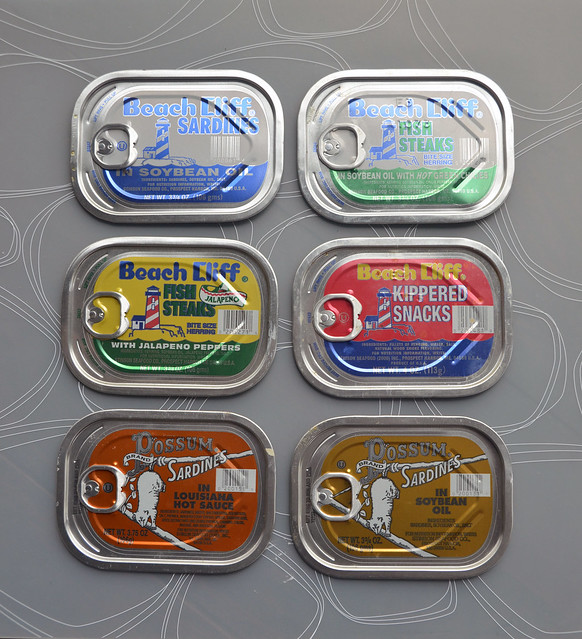Little Sumpin Sumpin from The Sardine King.
The skeletal remains of once thriving existence.
I'll take half a dozen of the with jalapeno peppers and a half a dozen in Louisiana hot sauce.
February 21, 2010
GUY RAZ, host:
The town of Prospect Harbor, Maine, sits across the water from Acadia National Park. It's a small, down-east fishing village, known in the region for its sardine cannery, Stinson Seafood.It's the last sardine cannery operating in the United States. It's been around for more than a century. And if you drive down the main street in Prospect Harbor, you're likely to see a large sign in the shape of a fisherman holding a can of Stinson's signature product: Beach Cliff Sardines.
This week, Stinson's parent company, Bumblebee Foods, said that because of federal limits on herring catches, the plant was no longer economically viable. They plan to close the cannery on April 18. The plant's a hundred and twenty-eight employees will lose their jobs.
One of those is plant manager Peter Colson. He's been with Stinson for 39 years.
Mr. PETER COLSON (Plant Manager, Stinson Seafood): That's on the payroll. I started before I was old enough to be on the payroll, working in the plant. I would do other odd jobs just to try to make some extra money by selling dents, which is dented product that can't be sold on the market, which I would buy for eight cents a can and sell them for 10 cents a can and make two cents.
RAZ: And how did you even get into the business in the first place?
Mr. COLSON: Well, my father was vice president of operations. At that time, he was plant manager of the facility. We kind of grew up in the business. I'd watch what he was doing and just was interested in how the people get along so well together and work together as an industry.
RAZ: Now, you've been there 39 years. What did you think? How did you react when you heard that the plant was shutting down?
Mr. COLSON: Well, the first thing I thought of was the people that I've worked with for so many years. We have one lady here that's worked here for 54 years. I've also handled parties for two ladies that worked here for 60 years. There's a lot of camaraderie around here that people don't want to leave once they get here.
RAZ: Is Stinson the biggest company in town?
Mr. COLSON: Yes, it is.
RAZ: The cannery has been in operation for at least a hundred years, right?
Mr. COLSON: That's correct.
RAZ: What is the building like?
Mr. COLSON: Well, we've done a lot of renovation. In 1968, the plant burnt down, and within a year, the Stinson family had put together a more-modern facility using concrete and steel, and they've made this into a very nice-looking operation.They modernized the equipment. Back years ago, when I first started, you'd need a hundred packers to cut the heads and the tails off with scissors. Now, we have automated machines that will cut the fish. What we used to use a hundred packers for we do with 20 packers, and they lay the fish in the can, already pre-cut.
RAZ: I understand this is the last sardine cannery in the United States.
Mr. COLSON: That's correct.
RAZ: In the country.
Mr. COLSON: Yes.
RAZ: Where have they gone? I mean, who's canning sardines?
Mr. COLSON: New Brunswick, Canada, will produce the remaining amount of sardines that are produced in North America. They're also produced in Europe and South America as well.
RAZ: Peter Colson, what are your plans? I mean, after the plant closes on the 18th of April, what will you do?
Mr. COLSON: Well, I have to facilitate the closing of the facility and make sure that we can, you know, relocate the people is my biggest concern. And then I don't know if I'm going to I would like to maintain my lifestyle in the town of Prospect Harbor, but we'll have to wait and see.
RAZ: That's Peter Colson. He's the plant manager of Stinson Seafood Company. It's the last-standing sardine cannery in America. It's set to close in mid-April. Peter Colson, good luck to you.
Mr. COLSON: Thank you very much.
Transcript provided by NPR, Copyright National Public Radio.
damn

3 comments:
Thanks King
How sad!
Damn, indeed.
Post a Comment